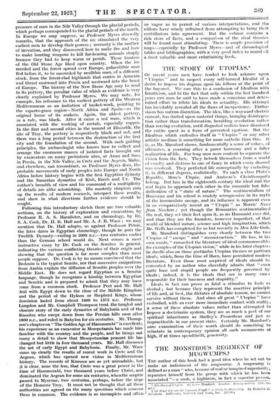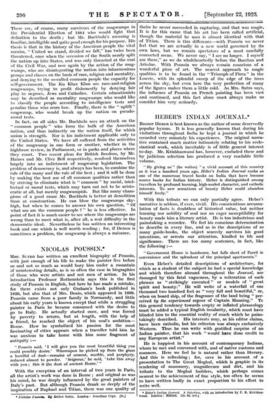THE MONSTROUS REGIMENT OF MUGWUMPS.t
Tim author of this book had a good idea when he set out to make an indictment of the mugwump. A mugwump is defined as a man " who, because of real or imagined superiority, separates himself from the group with which he has been associated "—a snob, a highbrow, in fact a superior person.
• The Story of Utopias. liy Lewis Mumford. London : Jlarrap and Cu. (104. Gd.
net.]
t Or What Use are Mc Common People' 0 Study in Democracy. By Heinrich 11.
Buchholz. Baltimore, %Varwicic end York. Inc. 1$2.00.,1
There arc, of course, many survivors of the mugwumps in the Presidential Election of 1884 who would fight that definition to the death ; but Mr. Buchholz's meaning is familiar, intelligible and quite good enough for his purpose. His thesis is that in the history of the American people the vital maxim, " United we stand, divided we fall," has twice been threatened, once when the secession of the South nearly split the nation up into States, and was only thwarted at the cost of the Civil War, and now again by the action of the mug- wumps, who are disintegrating the nation into inharmonious groups and classes on the basis of race, religion and mentality, and denying to the so-called common people the capacity for self-government. The Ku Klux Klan are race-and-religion mugwumps, trying to profit dishonestly by denying fair play to negroes, Jews and Catholics. Certain educationists may be described as mentality mugwumps who would like to classify the people according to intelligence tests and penalize those who score low. Finally, there is the " uplift" mugwump, who would break up the nation on pseudo- moral tests.
In fact, on all sides Mr. Buchholz sees an attack on the " common people " who form the bulk of the American nation, and thus indirectly on the nation itself, for which union is strength. Nor is his indictment applicable only to the United States. We have all suffered from the activities of the mugwump in one form or another, whether in the highbrow review, in Parliament, or in parks and places where they court. Two recent pleas for British freedom, by Mr. Haines and Mr. Clive Bell respectively, resolved themselves largely into an indictment of mugwump legislation. The problem of democracy is, and always has been, to combine the rule of the many and the rule of the best ; and it will be done by making the best use of all common qualities rather than by striving to eliminate what is " common " by racial, intel- lectual or moral tests, which may turn out not to be aristo- cratic at all, but merely mugwumpish. But like many cham- pions of a good cause Mr. Buchholz is better at demolition than at construction. He can blow the mugwumps sky- high, but when he comes to answer his own question, " Of what use are the common people ? " he is less effective. In point of fact it is much easier to see where the mugwumps are wrong than to meet what is, after all, a real difficulty in the democratic ideal. Nevertheless he has written an interesting book and one which is well worth reading ; for, if Demos is sometimes a problem, the mugwump is always a nuisance.







































 Previous page
Previous page